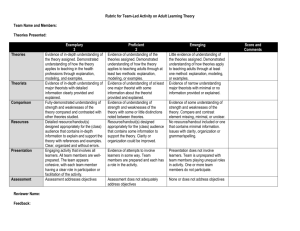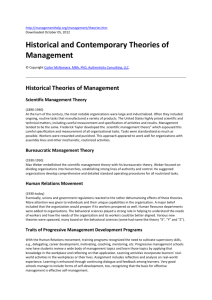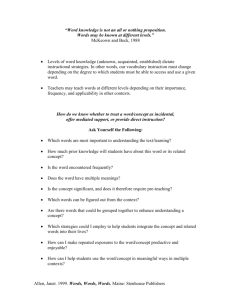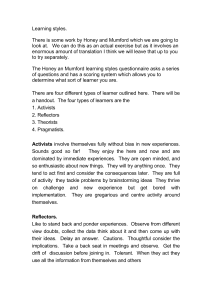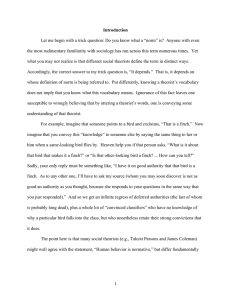word - Action Research @ actionresearch.net
advertisement
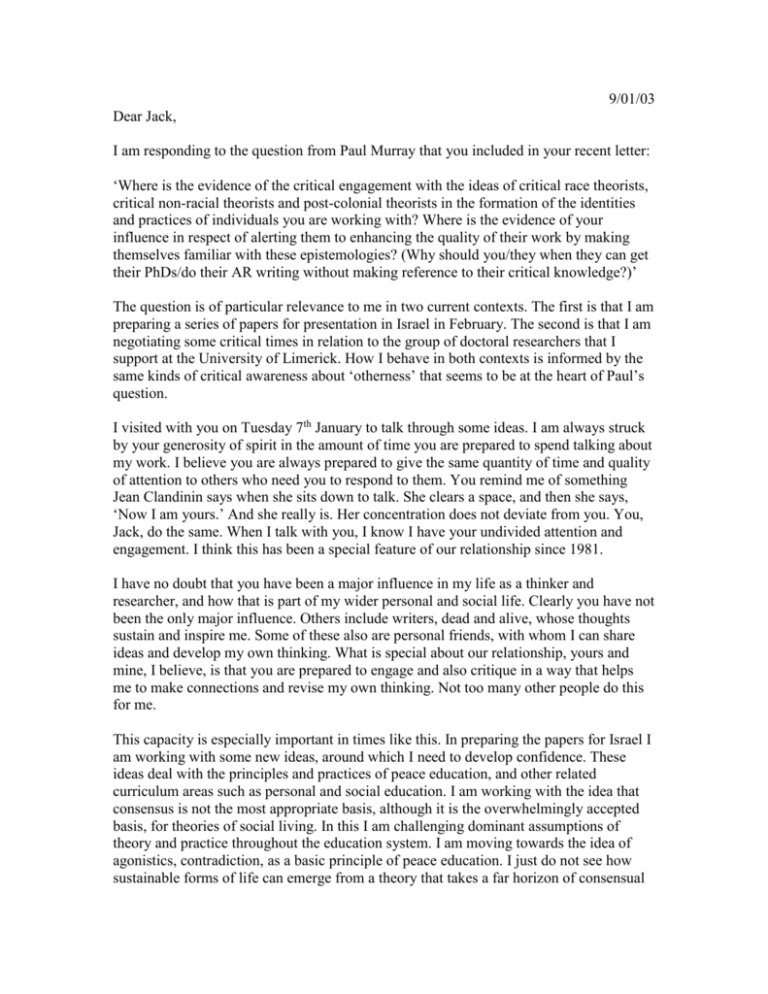
9/01/03 Dear Jack, I am responding to the question from Paul Murray that you included in your recent letter: ‘Where is the evidence of the critical engagement with the ideas of critical race theorists, critical non-racial theorists and post-colonial theorists in the formation of the identities and practices of individuals you are working with? Where is the evidence of your influence in respect of alerting them to enhancing the quality of their work by making themselves familiar with these epistemologies? (Why should you/they when they can get their PhDs/do their AR writing without making reference to their critical knowledge?)’ The question is of particular relevance to me in two current contexts. The first is that I am preparing a series of papers for presentation in Israel in February. The second is that I am negotiating some critical times in relation to the group of doctoral researchers that I support at the University of Limerick. How I behave in both contexts is informed by the same kinds of critical awareness about ‘otherness’ that seems to be at the heart of Paul’s question. I visited with you on Tuesday 7th January to talk through some ideas. I am always struck by your generosity of spirit in the amount of time you are prepared to spend talking about my work. I believe you are always prepared to give the same quantity of time and quality of attention to others who need you to respond to them. You remind me of something Jean Clandinin says when she sits down to talk. She clears a space, and then she says, ‘Now I am yours.’ And she really is. Her concentration does not deviate from you. You, Jack, do the same. When I talk with you, I know I have your undivided attention and engagement. I think this has been a special feature of our relationship since 1981. I have no doubt that you have been a major influence in my life as a thinker and researcher, and how that is part of my wider personal and social life. Clearly you have not been the only major influence. Others include writers, dead and alive, whose thoughts sustain and inspire me. Some of these also are personal friends, with whom I can share ideas and develop my own thinking. What is special about our relationship, yours and mine, I believe, is that you are prepared to engage and also critique in a way that helps me to make connections and revise my own thinking. Not too many other people do this for me. This capacity is especially important in times like this. In preparing the papers for Israel I am working with some new ideas, around which I need to develop confidence. These ideas deal with the principles and practices of peace education, and other related curriculum areas such as personal and social education. I am working with the idea that consensus is not the most appropriate basis, although it is the overwhelmingly accepted basis, for theories of social living. In this I am challenging dominant assumptions of theory and practice throughout the education system. I am moving towards the idea of agonistics, contradiction, as a basic principle of peace education. I just do not see how sustainable forms of life can emerge from a theory that takes a far horizon of consensual social living as its guiding principle. The ideas are of course particularly problematic for me, because the papers are to be presented in Israel, and there are some tensions around the visit already. Some people have picked up from my previous writing that I have visited Palestine, and have jumped to the conclusion that I am pro-Palestinian, and consequently anti-Israeli, not at all the case, in that I am pro-Palestinian AND pro-Israeli. I am pro-life. On the other hand, some academic colleagues have also picked up that I hope to go to Israel, and I have been subjected to some persuasion to join the academic boycott. I am deeply struck by the grand narratives of consensus and indiscriminate belief in fundamentalist positions across the different ideologies and in the different contexts. I am maintaining my own position of making up my own mind in regard to the actions I take, and am at pains to justify my actions in terms of what I consider a good social order. The critical times in relation to my group in Limerick is that we are at a point where I am urging the group to become critical. I have until now been working hard to develop a protective context, given that the group exists in a potentially hostile epistemological environment. My hope has been to build up the confidence of members of the group so that they understand how their work is very important and can contribute to wider thinking. This has been a painstaking process. However, one of the disadvantages of developing norms of care and sensitivity is that the group has become rather desensitised to critique. While I ask them constantly to reflect on what they are doing, I do believe the reflection has become rather reified. My anxiety around this is that some members of the group might suddenly wake up to the fact that they live in a discriminatory world and find themselves disadvantaged in their own thinking. I recognise that I might have deliberately lulled them into a false sense of security, believing that I am acting for their benefit, but possibly not doing so at all. So I have recently instigated certain measures to encourage them to become critical, particularly in relation to how they are positioned within wider social and organisational contexts. One of my strategies was to ask them to write a position paper in light of some of our recent critical discussions. The quality of thinking in some of these papers is, in my opinion, quite outstanding. I hope to bring with me to the seminar on Monday 13th the position papers of colleagues and compare them with their papers of a short year ago. One colleague in particular, a lady who is working with Traveller children, took as her initial research question, ‘How do I persuade Traveller children to stay in the school system?’ In just over a year she has changed her question to ‘How do I challenge normative conceptualisations of schooling so that Traveller children will benefit from education?’ She has directly engaged with issues of prejudice and intolerance, and the grand narratives of power and control. I will also bring with me a letter, received this morning, from another colleague, who writes in response to some of my own writing that I sent her: ‘I wonder though if the epistemologies that inform school curricula are those of alienation etc. I'm not so sure...though I feel that there are differences between primary and secondary levels. On the other hand, and this is gnawing at me a little...perhaps I am one of those who are blindfolded and unaware of the power wielding that is going on around me. Am I naive to think that the epistemologies that inform curricula may indeed be inclusive, holistic, respectful, creative …; am I a victim of the propaganda machine? Or, are my teaching colleagues part of Foucault's regime of power that reinforces messages about the how social systems should be reproduced?’ I do believe that the process of encouraging people to become critical, not only of the external power relations that inform the social and organisational situations they are in, but also of their own process of understanding, is one of educative influence. There is no way, I think, that my colleagues would have come to these understandings that are giving new directions and new meanings to their lives through some kind of didactic pedagogy. They have come to these understandings, I believe, because I, following your ideas, Jack, which were commensurate with my own, have held as a core principle of my practice the idea that people are capable of learning for themselves. What I need to do is ask the right kind of questions that will help them make that learning explicit for themselves, and come to the kinds of choices about what they do with that learning that is right for them. In our conversation you spoke of how the people I support have engaged with Rawls’s idea of privileging the underprivileged. I believe this is what they have done. I believe it is what I have done. You also spoke of the difficulty of overcoming the Kantian idea of the transcendence of the consciousness, another new idea for me. I see that you and I and others do not see consciousness as a reified object in the world, but always in relation to personal and social practice. I need to work more with these ideas. There, Jack, I could write forever on these issues. In response to the question, ‘Where is the evidence of the critical engagement with the ideas of critical race theorists, critical non-racial theorists and post-colonial theorists in the formation of the identities and practices of individuals you are working with? Where is the evidence of your influence in respect of alerting them to enhancing the quality of their work by making themselves familiar with these epistemologies?’ I hope this letter will stand by way of evidence to show how you have helped me to get to this present stage in my own thinking, and how I in turn have helped others also to progress. I do not mean ‘progress’ in a historicist sense. I mean ‘progress’ in terms of celebrating the immediacy of life and its affirmation. I believe people and I have managed to allow our tacit knowledges to emerge as explicit actions. Your influence is there, direct and indirect. You never told me what to think. I already thought for myself, and continue to do so. You, among others, have helped me to clarify my own thinking and to refine it. A question that always concerns me, however, is, ‘How do I, Jean, influence you, Jack?’ I have no idea what your response might be. In relation to the question ‘Why should you/they when they can get their PhDs/do their AR writing without making reference to their critical knowledge?’ Yes, we all know that it is possible to get a PhD in or out of action research without making reference to our critical knowledge. These are the kinds of action research dissertations and theses that you and I have read and examined in other institutions. Yet you and I have always chosen to locate our understanding of action research in relation to the evolution of a good social order, and one of the core principles of a good social order has been the idea that action enquiries have to be related to the well being of other people. The well being of some is generally contingent on the responses of others, which is shown through the literatures that Paul cites. Further, a core feature of the generation of the personal theories of the people we support has been consistently to pose the important question articulated by, among others, Polanyi (1958) and Popper (1972) and Richard Pring (2000), ‘How will you know if you are wrong?’ I have never been so aware of the power of that question as I am at the moment, as I get ready to go to Israel and also as I work with others in preparing a conference in June that is designed to test the accounts of the researchers whom I support. The same kinds of anxieties underpin both contexts. How will people respond? Will they respond with grace and kindness, recognising that one’s thinking is always emerging and that one does not ‘get it right’, all in one go, if at all. I am coming to the position increasingly where I actually don’t want to have it right. I see my ‘rightness’ also as having the potential to degenerate into a grand narrative that could inspire fundamentalism. How will I know if I am wrong? I think I will know I am wrong when I stop worrying about these things. And that brings me back to what is very special about your responses to me. You respect my hesitancy. You respect the fact that I can be a knowledgeable person, a wise person, who is always working it out. My own position of always being in process of working it out, and your position of recognising the provisionality of what I say, is for me a binding norm of our relationship. Through your influence, and that of others, I have the strength not to become fixed in one position, and to resist theories and forms of theories that try to enclose me in reified social or intellectual structures. I know how important critical theories of colonisation and imperialism are, but I also know how important it is to critique them, too. So I guess at the end of the day I am left wondering, ‘What’s it all about?’ And that is enough to sustain me for this day. Love, Jean
